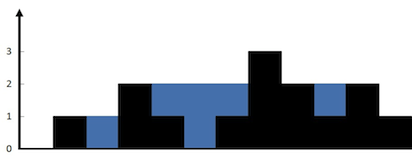42. 接雨水 hard
给定 n 个非负整数表示每个宽度为 1 的柱子的高度图,计算按此排列的柱子,下雨之后能接多少雨水。

示例 1:
输入:height = [0,1,0,2,1,0,1,3,2,1,2,1]
输出:6
解释:上面是由数组 [0,1,0,2,1,0,1,3,2,1,2,1] 表示的高度图,在这种情况下,可以接 6 个单位的雨水(蓝色部分表示雨水)。
示例 2:
输入:height = [4,2,0,3,2,5]
输出:9
解题思路
输入:一个整数数组 height
输出:计算出下雨之后可以接多少雨水
本题属于 相向双指针 问题。
- 我们可以把每一个台阶想象成一个左右高低不同的木桶
- 木桶的 左侧板高度 就是 前缀最大值
- 木桶的 右侧板高度 就是 后缀最大值
木桶能装的水 = min(左侧高度, 右侧高度) - 木桶底部高度(柱子高度)
所以我们可以先计算出每个木桶的前缀最大高度 left_max, 以及每个木桶的后缀最大高度 right_max
然后遍历每一个木桶 min(left_max[i], right_max[i]) - height[i] 就是每个木桶能装的水
进阶优化空间
我们可以通过数组来存储每个木桶的左右两端最大高度,也可以用双指针来解决
假如我们遍历到一个木桶时,我们是可以知道左侧高度或者右侧高度其中一个的
- 假如我们知道当前木桶左侧高度为
left_max - 我们虽然不知道当前木桶的右侧高度,但是我们可以知道右指针指向的木桶的最大高度
right_max - 当
left_max < right_max时,当前木桶的能装的水就是left_max - height[i] - 因为就算当前木桶右侧高度是 0,但是更远处还有更高的木桶,所以依然可以装着么多水
- 右侧也同理,这样我们就可以将空间复杂度优化到
O(1)
代码实现
python
class Solution:
def trap(self, height: List[int]) -> int:
# 将每个格子都看成一个水桶,水桶的左端就是左侧最大值,右端就是右侧最大值,能装的水就是 水桶的短板 - 水桶底板高度(台阶高度)
n = len(height)
if n == 0:
return 0 # 边界情况处理
# left_max[i] 表示位置 i 左侧(包括 i)最高的柱子高度
left_max = [0] * n
left_max[0] = height[0]
for i in range(1, n):
left_max[i] = max(height[i], left_max[i - 1])
# right_max[i] 表示位置 i 右侧(包括 i)最高的柱子高度
right_max = [0] * n
right_max[-1] = height[-1]
for i in range(n - 2, -1, -1):
right_max[i] = max(height[i], right_max[i + 1])
# 遍历每个位置,计算当前位置能存多少水
total_water = 0
for i in range(n):
# 当前格子的水量 = min(左边最高, 右边最高) - 当前高度
water_level = min(left_max[i], right_max[i])
trapped = water_level - height[i]
total_water += trapped
return total_waterjavascript
/**
* @param {number[]} height
* @return {number}
*/
var trap = function(height) {
const n = height.length;
const leftMax = Array(height.length).fill(0);
const rightMax = Array(height.length).fill(0);
leftMax[0] = height[0];
for (let i = 1; i < n; i++) {
leftMax[i] = Math.max(height[i], leftMax[i - 1]);
}
rightMax[n - 1] = height[n - 1];
for (let j = n - 2; j >= 0; j--) {
rightMax[j] = Math.max(height[j], rightMax[j + 1]);
}
let ans = 0;
for (let k = 0; k < n; k++) {
ans += Math.min(leftMax[k], rightMax[k]) - height[k]
}
return ans;
};空间优化版
python
class Solution:
def trap(self, height: List[int]) -> int:
n = len(height)
# 初始化左右指针和对应的最大高度
left, right = 0, n - 1
left_max, right_max = 0, 0
total_water = 0 # 累计接到的雨水
# 当左右指针没有相遇时进行遍历
while left <= right:
# 维护当前左右两边的最大高度
left_max = max(left_max, height[left])
right_max = max(right_max, height[right])
# 谁的最大高度小,谁就先处理
if left_max < right_max:
# 此时左边是短板,能接的水 = 左边最大高度 - 当前高度
total_water += left_max - height[left]
left += 1
else:
# 右边是短板,能接的水 = 右边最大高度 - 当前高度
total_water += right_max - height[right]
right -= 1
return total_waterjavascript
/**
* @param {number[]} height
* @return {number}
*/
var trap = function(height) {
let leftMax = 0;
let rightMax = 0;
let left = 0;
let right = height.length - 1;
let ans = 0;
while (left <= right) {
leftMax = Math.max(leftMax, height[left]);
rightMax = Math.max(rightMax, height[right]);
if (leftMax < rightMax) {
ans += leftMax - height[left];
left++;
} else {
ans += rightMax - height[right];
right--;
}
}
return ans;
}复杂度分析
时间复杂度:O(n)
空间复杂度:O(n) or O(1)